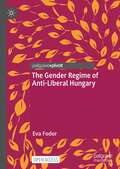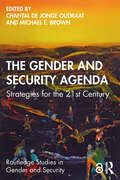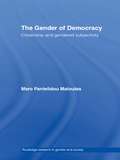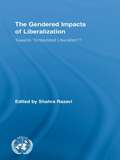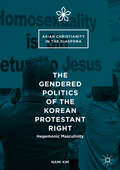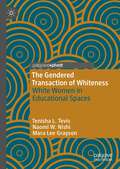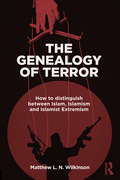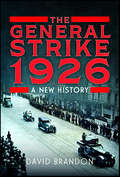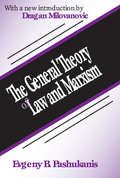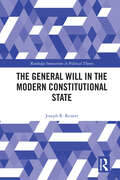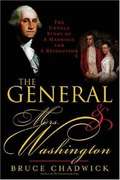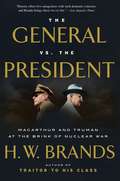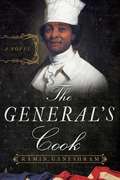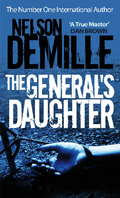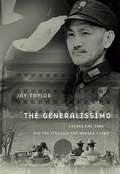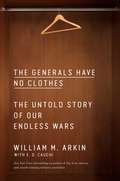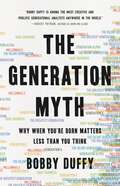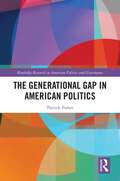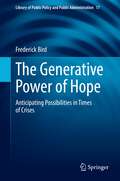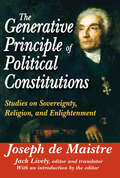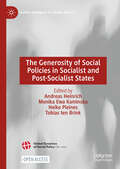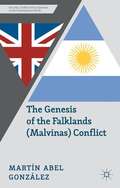- Table View
- List View
The Gender Regime of Anti-Liberal Hungary
by Eva FodorThis Open Access book explains a new type of political order that emerged in Hungary in 2010: a form of authoritarian capitalism with an anti-liberal political and social agenda. Eva Fodor analyzes an important part of this agenda that directly targets gender relations through a set of policies, political practice and discourse—what she calls “carefare.” The book reveals how this is the anti-liberal response to the crisis-of-care problem and establishes how a state carefare regime disciplines women into doing an increasing amount of paid and unpaid work without fair remuneration. Fodor analyzes elements of this regime in depth and contrasts it to other social policy ideal-types, demonstrating how carefare is not only a set of policies targeting women, but an integral element of anti-liberal rule that can be seen emerging globally.
The Gender and Security Agenda: Strategies for the 21st Century (Routledge Studies in Gender and Security)
by Michael E. Brown Chantal De Jonge OudraatThis book examines the gender dimensions of a wide array of national and international security challenges. The volume examines gender dynamics in ten issue areas in both the traditional and human security sub-fields: armed conflict, post-conflict, terrorism, military organizations, movement of people, development, environment, humanitarian emergencies, human rights, governance. The contributions show how gender affects security and how security problems affect gender issues. Each chapter also examines a common set of key factors across the issue areas: obstacles to progress, drivers of progress and long-term strategies for progress in the 21st century. The volume develops key scholarship on the gender dimensions of security challenges and thereby provides a foundation for improved strategies and policy directions going forward. The lesson to be drawn from this study is clear: if scholars, policymakers and citizens care about these issues, then they need to think about both security and gender. This will be of much interest to students of gender studies, security studies, human security and International Relations in general.
The Gender and Security Agenda: Strategies for the 21st Century (Routledge Studies in Gender and Security)
by Michael E. Brown Chantal de Jonge OudraatThis book examines the gender dimensions of a wide array of national and international security challenges.The volume examines gender dynamics in ten issue areas in both the traditional and human security sub-fields: armed conflict, post-conflict, terrorism, military organizations, movement of people, development, environment, humanitarian emergencies, human rights, governance. The contributions show how gender affects security and how security problems affect gender issues.Each chapter also examines a common set of key factors across the issue areas: obstacles to progress, drivers of progress and long-term strategies for progress in the 21st century. The volume develops key scholarship on the gender dimensions of security challenges and thereby provides a foundation for improved strategies and policy directions going forward. The lesson to be drawn from this study is clear: if scholars, policymakers and citizens care about these issues, then they need to think about both security and gender.This will be of much interest to students of gender studies, security studies, human security and International Relations in general.The Open Access version of this book, available at http://www.taylorfrancis.com, has been made available under a Creative Commons Attribution-Non Commercial-No Derivatives (CC-BY-NC-ND) 4.0 license.
The Gender of Democracy: Citizenship and Gendered Subjectivity (Routledge Research in Gender and Society #Vol. 12)
by Maro Pantelidou MaloutasAs developments in the European Union and elsewhere make the re-examination of citizenship a pressing issue, this book reflects on the persisting "masculine" character of contemporary democracy and the measures taken in the EU to combat it. Combining a theoretical approach with a specific critique of EU gender policy, The Gender of Democracy argues that substantial democracy as a social project cannot co-exist with the existing system of gender relations ,which are inherently dichotomous and thus demarcate social categories of superior and inferior status. Drawing on utopian thought, Maro Pantelidou Maloutas proposes a re-examination of the notion of the gendered subject and a revision of the dominant perceptions of the relations between sex, sexuality and gender. The book contains a critique of specific EU gender policies and shows how in seeking to do away with gender inequality, simply formulating policies that are pro-women is not enough. In order to approach democracy’s emancipatory component, far-reaching policies which deconstruct rather than modernize gender relations are needed.
The Gendered Impacts of Liberalization: Towards "Embedded Liberalism"? (Routledge/UNRISD Research in Gender and Development)
by Shahra RazaviIn the last two decades public policies have reflected a drive for accelerated global economic integration ("globalization"), associated with greater economic liberalization. The outcomes have been largely disappointing, even in the estimate of their designers. Rural livelihoods have become more insecure, and the expected growth has rarely materialized. Insecurity is also etched into the growth of informal economies across the world. Yet the economic policy agenda that has been so adverse to many people around the world has also provided new opportunities to some social groups, including some low-income women. In response to widespread discontent with the liberalization agenda, more attention is now being given to social policies and governance issues, viewed as necessary if globalization is to be "tamed" and "embedded". The contributors to this volume address key issues and questions such as whether states have the capacity to remedy the social distress unleashed by liberalization in the absence of any major revision of their macroeconomic policies and whether the proposed social policy reforms can redress gender-based inequalities in access to resources and power.
The Gendered Politics of the Korean Protestant Right
by Nami KimThis book provides a critical feminist analysis of the Korean Protestant Right's gendered politics. Specifically, the volume explores the Protestant Right's responses and reactions to the presumed weakening of hegemonic masculinity in Korea's post-hypermasculine developmentalism context. Nami Kim examines three phenomena: Father School (an evangelical men's manhood and fatherhood restoration movement), the anti-LGBT movement, and Islamophobia/anti-Muslim racism. Although these three phenomena may look unrelated, Kim asserts that they represent the Protestant Right's distinct yet interrelated ways of engaging the contested hegemonic masculinity in Korean society. The contestation over hegemonic masculinity is a common thread that runs through and connects these three phenomena. The ways in which the Protestant Right has engaged the contested hegemonic masculinity have been in relation to "others," such as women, sexual minorities, gender nonconforming people, and racial, ethnic, and religious minorities.
The Gendered Transaction of Whiteness: White Women in Educational Spaces
by Tenisha L. Tevis Naomi W. Nishi Mara Lee GraysonThis book considers the causes and effects of an education field that remains white and gendered and critically examines how the race-gendered power afforded to white women in educational spaces is transacted through instructional practices and interpersonal interactions. White women occupy a complex position in society within systems of white supremacy and patriarchy, participating as both oppressors and oppressed. Emphasizing the consequences of whiteness for educational professionals and students of all racial identities, the chapters in this book offer strategies for identifying and moving beyond the gendered transaction of whiteness, including what white women can do instead and how all educators can work toward transformative antiracist education.
The Genealogy of Terror: How to distinguish between Islam, Islamism and Islamist Extremism (Law and Religion)
by Matthew L. WilkinsonIn the first two decades of the twenty-first century, the events of 9/11, 7/7, the War on Terror and the Caliphate and atrocities of the so-called Islamic State have dominated Western consciousness and wreaked havoc in parts of the Muslim-majority world. In their wake, a spate of books has been written explaining the phenomenon of Islamist radicalisation and Jihadism. Nevertheless, for normal citizens, as well as scholars of religion and legal professionals, the crucial question remains unanswered: how is mainstream Islam different from both Islamism and the Islamist Extremism that is used to justify terrorist violence? In this highly original book, which draws upon the author’s experience as an expert witness in Islamic theology in 27 counter-terrorism trials, the author uses the idea of the Worldview, as well as traditional Islamic theology, to answer this question. The book explains not only what Mainstream Islam, Ideological Islamism and Islamist Extremism are in their broad philosophical characteristics and theological particulars, but also explains comprehensively how and why they are both superficially related and yet essentially and fundamentally different. In so doing, the book also illuminates the cast of characters and the development of their ideas that constitute Mainstream Islam, Ideological Islamism and the Non-Violent and Violent Islamist Extremists who constitute the Genealogy of Terror.
The General Strike 1926: A New History
by David BrandonThe General Strike was one of the most significant events in twentieth century Britain. The miners were locked out and the mass of rank-and-file trade unionists then came out on strike in their support. With their families and some middle-class sympathizers, the miners and the labor and trade union movement found itself pitched against the political establishment, the apparatus of the state, the powerful mineowners backed by the Conservative Government and most of the media of the time in what was the sharpest form of class conflict short of political revolution. It had always said that the British didn't do general strikes. In 1926 they certainly did! 2026 will mark the one-hundredth anniversary of the General Strike and, under the very different economic, social and political conditions of post-industrial, post-Brexit Britain, it is worth revisiting and examining the complicated coming together of factors which were eventually to lead to those extraordinary days in May 1926 when the fate of the nation lay in the balance. The author examines the economic, social and political processes taking places from the mid-nineteenth century and argues that this major confrontation between labor and capital was probably inevitable. He examines particularly the symbiotic relationship between the coal miners and the railway workers and the troubled industrial relations in those industries. His informed and lucid account should interest students of modern British history, labor history and the fortunes of the railways in this period.
The General Theory of Law and Marxism
by Evgeny PashukanisE. B. Pashukanis was the most significant contemporary to develop a fresh, new Marxist perspective in post-revolutionary Russia. In 1924 he wrote what is probably his most influential work, The General Theory of Law and Marxism. In the second edition, 1926, he stated that this work was not to be seen as a final product but more for ""self-clarification"" in hopes of adding ""stimulus and material for further discussion."" A third edition was printed in 1927.Pashukanis's ""commodity-exchange"" theory of law spearheaded a perspective that traced the form of law, not to class interests, but to capital logic itself. Until his death, he continued to argue for the ideal of the withering away of the state, law, and the juridic subject. He eventually arrived at a position contrary to Stalin's who, at that time, was attempting to consolidate and strengthen the state apparatus under the name of the dictatorship of the proletariat. Inevitably, Pashukanis was branded an enemy of the revolution in January 1937. His works were subsequently removed from soviet libraries. In 1954, Pashukanis was ""rehabilitated"" by the Soviets and restored to an acceptable position in the historical development of marxist law.In Europe and North America, a number of legal theorists only rediscovered Pashukanis's work in the late 1970s. They subjected it to careful critical analysis, and realized that he offered an alternative to the traditional Marxist interpretations, which saw law simply and purely as tied to class interests of domination. By the mid-1980s the instrumental Marxist perspective in vogue in Marxist sociology, criminology, politics, and economics gave way, to a significant extent due to Pashukanis's insights, to a more structural Marxist accounting of the relationship of law to economics and other social spheres.In his new introduction, Dragan Milovanovic discusses the life of Pashukanis, Marx and the commodity-exchange theory of law, and the historical lessons of Pashukanis's work. This bo
The General Will
by David Lay Williams James FarrAlthough it originated in theological debates, the general will ultimately became one of the most celebrated and denigrated concepts emerging from early modern political thought. Jean-Jacques Rousseau made it the central element of his political theory, and it took on a life of its own during the French Revolution, before being subjected to generations of embrace or opprobrium. James Farr and David Lay Williams have collected for the first time a set of essays that track the evolving history of the general will from its origins to recent times. The General Will: The Evolution of a Concept discusses the general will's theological, political, formal, and substantive dimensions with a careful eye toward the concept's virtues and limitations as understood by its expositors and critics, among them Arnauld, Pascal, Malebranche, Leibniz, Locke, Spinoza, Montesquieu, Kant, Constant, Tocqueville, Adam Smith, and John Rawls.
The General Will in the Modern Constitutional State (Routledge Innovations in Political Theory)
by Joseph R. ReisertIn The General Will in the Modern Constitutional State, Joseph R. Reisert challenges standard interpretations of Rousseau, according to which his political theory either has nothing to offer the present but a radical critique or commends an illiberal, plebiscitary democracy. Reisert argues that the principles of political right Rousseau sets forth in The Social Contract are correct and that the political institutions of modern constitutional and democratic states substantially satisfy them.Rousseau’s central normative commitments – to popular sovereignty, constitutional law, representative government, the rule of law, periodic elections, universal suffrage, and equal basic rights for all – correspond closely to our contemporary understanding of what political legitimacy requires. Taking seriously Rousseau’s claim that a sort of contract lies at the foundation of every political society, Reisert offers a novel interpretation of willing a general will, arguing that the experience of formulating and acting upon a general will is as common as are the experiences of membership in a civic association and of undertaking any collective activity as a member of such an organization. Reisert expertly demonstrates that, when we recognize that a nation’s true constitution is the content of the people’s general will, we will be able to see how our political institutions (mostly) satisfy Rousseau’s normative principles of political right, and we will also discover new perspectives on constitutional politics and constitutional interpretation.The General Will in the Modern Constitutional State will be of interest to those who study Rousseau’s political thought, history of political thought, constitutionalism, and constitutional theory.
The General and Mrs. Washington: The Untold Story of a Marriage and a Revolution
by Bruce ChadwickA biography of the George and Martha Washington that establishes their place in history and captures their personalities and the deep love they had for each other. The stunning impact of their marriage on the Revolution is greater than you could have ever imagined. No biography of George Washington and his life together with his wife Martha has ever been published, and this is one of the great love stories. It tells their personal story, one often filled with tragedy. Martha had four children, George none. He became the stepfather to her offspring. Her daughter, an epileptic, died in his arms as he tried to save her. Their son Jackie, 28, a soldier, died at Yorktown from malaria. Several times in their life together, Martha saved George's life when he became mortally ill. She joined him in his winter camps to bring him comfort and grace. Every morning they would have breakfast together for one hour and the order was given that no one could interrupt them, no matter what the reason. Though the richest woman in Virginia, Martha joined her husband in his revolutionary cause. The book will also explain why these twopeople of considerable privilege committed acts of treason and rebelled against the King and England.
The General vs. the President: MacArthur and Truman at the Brink of Nuclear War
by H. W. BrandsFrom master storyteller and historian H. W. Brands comes the riveting story of how President Harry Truman and General Douglas MacArthur squared off to decide America's future in the aftermath of World War II. At the height of the Korean War, President Harry S. Truman committed a gaffe that sent shock waves around the world. When asked by a reporter about the possible use of atomic weapons in response to China's entry into the war, Truman replied testily, "The military commander in the field will have charge of the use of the weapons, as he always has." This suggested that General Douglas MacArthur, the willful, fearless, and highly decorated commander of the American and U.N. forces, had his finger on the nuclear trigger. A correction quickly followed, but the damage was done; two visions for America's path forward were clearly in opposition, and one man would have to make way. Truman was one of the most unpopular presidents in American history. Heir to a struggling economy, a ruined Europe, and increasing tension with the Soviet Union, on no issue was the path ahead clear and easy. General MacArthur, by contrast, was incredibly popular, as untouchable as any officer has ever been in America. The lessons he drew from World War II were absolute: appeasement leads to disaster and a showdown with the communists was inevitable--the sooner the better. In the nuclear era, when the Soviets, too, had the bomb, the specter of a catastrophic third World War lurked menacingly close on the horizon. The contest of wills between these two titanic characters unfolds against the turbulent backdrop of a faraway war and terrors conjured at home by Joseph McCarthy. From the drama of Stalin's blockade of West Berlin to the daring landing of MacArthur's forces at Inchon to the shocking entrance of China into the war, The General and the President vividly evokes the making of a new American era.From the Hardcover edition.
The General's Cook: A Novel
by Ganeshram RaminPhiladelphia 1793. Hercules, President George Washington’s chef, is a fixture on the Philadelphia scene. He is famous for both his culinary prowess and for ruling his kitchen like a commanding general. He has his run of the city and earns twice the salary of an average American workingman. He wears beautiful clothes and attends the theater. But while valued by the Washingtons for his prowess in the kitchen and rewarded far over and above even white servants, Hercules is enslaved in a city where most black Americans are free. Even while he masterfully manages his kitchen and the lives of those in and around it, Hercules harbors secrets-- including the fact that he is learning to read and that he is involved in a dangerous affair with Thelma, a mixed-race woman, who, passing as white, works as a companion to the daughter of one of Philadelphia's most prestigious families. Eventually Hercules’ carefully crafted intrigues fall apart and he finds himself trapped by his circumstance and the will of George Washington. Based on actual historical events and people, The General's Cook, will thrill fans of The Hamilton Affair, as they follow Hercules' precarious and terrifying bid for freedom.
The General's Daughter (Paul Brenner)
by Nelson DeMilleHer murder was just the beginning. She was an army captain and the daughter of legendary General 'Fighting Joe' Campbell, when her body was found - naked and bound - on the firing range of Fort Hadley. This political powder keg of a case goes directly to elite army investigator Paul Brenner and rape specialist Cynthia Sunhill - and explodes.Behind the military code of honour, Brenner and Sunhill uncover trails of corruption - all leading to the golden girl's shocking secret life.
The Generalissimo: Chiang Kai-Shek and the Struggle for Modern China
by Jay TaylorThe Generalissimo provides the most lively, sweeping, and objective biography of Chiang Kai-shek and the struggle for modern China.
The Generals Have No Clothes: The Untold Story of Our Endless Wars
by William M. ArkinThe definitive book about America&’s perpetual wars and how to end them from bestselling author, military expert, and award-winning journalist William M. Arkin.The first rule of perpetual war is to never stop, a fact which former NBC News analyst William M. Arkin knows better than anyone, having served in the Army and having covered all of America&’s wars over the past three decades. He has spent his career investigating how the military throws around the word &“war&” to justify everything, from physical combat to today&’s globe-straddling cyber and intelligence network. In The Generals Have No Clothes, Arkin traces how we got where we are—bombing ten countries, killing terrorists in dozens more—all without Congressional approval or public knowledge. Starting after the 9/11 attacks, the government put forth a singular idea that perpetual war was the only way to keep the American people safe. Arkin explains why President Obama failed to achieve his national security goal of ending war in Iraq and reducing our military engagements, and shows how President Trump has been frustrated in his attempts to end conflict in Afghanistan and Syria. He also reveals how COVID-19 is a watershed moment for the military, where the country&’s civilian and public health needs clash with the demands of future wars against China and Russia, North Korea and Iran. Proposing bold solutions, Arkin calls for a new era of civilian control over the military. He also calls for a Global Security Index (GSX), the security equivalent to the Dow Jones Industrial Average, which would measure the national and international events in real time to determine whether perpetual war is actually making the nation safer. Arguing that the American people should be empowered by facts rather than spurred by fear, The Generals Have No Clothes outlines how we can take control of the military…before it&’s too late.
The Generation Myth: Why When You're Born Matters Less Than You Think
by Bobby DuffyMillennials, Baby Boomers, Gen Z—we like to define people by when they were born, but an acclaimed social researcher explains why we shouldn't.Boomers are narcissists. Millennials are spoiled. Gen Zers are lazy. We assume people born around the same time have basically the same values. It makes for good headlines, but is it true?Bobby Duffy has spent years studying generational distinctions. In The Generation Myth, he argues that our generational identities are not fixed but fluid, reforming throughout our lives. Based on an analysis of what over three million people really think about homeownership, sex, well-being, and more, Duffy offers a new model for understanding how generations form, how they shape societies, and why generational differences aren&’t as sharp as we think.The Generation Myth is a vital rejoinder to alarmist worries about generational warfare and social decline. The kids are all right, it turns out. Their parents are too.
The Generational Gap in American Politics (Routledge Research in American Politics and Governance)
by Patrick FisherThis book examines the history of the generational gap in American politics, with an emphasis on the remarkable contemporary gap. Using data derived primarily from the American National Election Studies (ANES), 2020 National Election Pool, A.P VoteCast, and the Pew Research Center, Patrick Fisher argues that the political environment experienced by successive generations as they have come of age politically influences political attitudes throughout one’s life. The result is that different generations have distinct political leanings that they will maintain over their lifetimes. Fisher examines each generation from the Greatest Generation through to Generation Z, who have recently started to come of voting age. He cites the entry of the Millennial Generation and Generation Z into the electorate as completely changing the generational dynamics of American politics, through their distinct political leanings that are significantly to the left of older generations. As a result he concludes that demographically, politically, economically, socially, and technologically, the generations are more different from each other now than at any time in living memory. The Generational Gap in American Politics will appeal to a scholarly and public audience interested in American politics in general and political behavior in particular.
The Generational Gap in American Politics (Routledge Research in American Politics and Governance)
by Patrick FisherThis book examines the history of the generational gap in American politics, with an emphasis on the remarkable contemporary gap.Using data derived primarily from the American National Election Studies (ANES), 2020 National Election Pool, A.P VoteCast, and the Pew Research Center, Patrick Fisher argues that the political environment experienced by successive generations as they have come of age politically influences political attitudes throughout one’s life. The result is that different generations have distinct political leanings that they will maintain over their lifetimes. Fisher examines each generation from the Greatest Generation through to Generation Z, who have recently started to come of voting age. He cites the entry of the Millennial Generation and Generation Z into the electorate as completely changing the generational dynamics of American politics, through their distinct political leanings that are significantly to the left of older generations. As a result he concludes that demographically, politically, economically, socially, and technologically, the generations are more different from each other now than at any time in living memory.The Generational Gap in American Politics will appeal to a scholarly and public audience interested in American politics in general and political behavior in particular.
The Generative Power of Hope: Anticipating Possibilities in Times of Crises (Library of Public Policy and Public Administration #17)
by Frederick BirdThis book analyses how and why we are living at a critical moment in the history of human life on earth and explores how we find grounds for the hopes that will enable us to address the challenges and crises of our time. The author analyses hope both practically and philosophically as a generative virtue to realistically discern the situations in which we find ourselves, and imaginatively to anticipate possibilities when the future is unknown and uncertain. The author argues that hope is a mean between anomy, disillusionment, and despair, on the one hand, and wishful thinking, dreaming, and fanaticizing, on the other hand. The book not only examines – and analyzes from a historical perspective - the contemporary crises such as climate change, environmental degradation and its effects such as the social costs of these developments, but also further analyzes the character and micro-dynamics of hope and how it makes a difference in how we manage the crises which inevitably emerge. Though contemporary crises are those we tend to focus on, the author also engages with what is involved in a due regard for history and the relevance of a sense of history for addressing the crises of our time. He shows us what we can learn from revisiting some thoughtful reflections by thinkers like Niebuhr, Jaspers, Camus, and Arendt. Finally, the author shows us what is involved practically in anticipating possibilities, by looking at hope as a social practice and noting how hopeful people make a difference.
The Generative Principle of Political Constitutions: Studies on Sovereignty, Religion and Enlightenment (Scholars' Facsimiles And Reprints Ser.)
by Joseph de MaistreJoseph de Maistre had no doubt that the root causes of the French Revolution were intellectual and ideological. The degeneration of its first immense hopes into the Reign of Terror was not the result of a ruthless competition for power or of prospects of war. He echoed Voltaire's boast that "books did it all." The philosophers of the Enlightenment were the architects of the new regimes; and the shadow between revolutionary idea and social reality could be traced directly to a fatal flaw in their thought.De Maistre asserts that society is the product, not of men's conscious decision, but of their instinctive makeup. Both history and primitive societies illustrate men's gravitation toward some form of communal life. Since government is in this sense natural, it can not legitimately be denied, revoked, or even disobeyed by the people. Sovereignty is not the product of the deliberation or the will of the people; it is a divinely bestowed authority fitted not to man's wishes but to his needs.The French Revolution to de Maistre's mind was little more than the expansion, conversion, pride, and consequent moral corruption of the philosophers. It differs in essence from all previous political revolutions, finding a parallel only in the biblical revolt against heaven. These sentiments are the passionate and awe-inspired language of one who sees the political struggles of his time on a huge and cosmic scale, judges events sub specie aeternitatis (under the aspect of eternity), and looks on revolution and counter-revolution as a battle for the soul of humanity. The force of this classic volume still resonates in present-day ideological struggles.
The Generosity of Social Policies in Socialist and Post-Socialist States (Global Dynamics of Social Policy)
by Heiko Pleines Andreas Heinrich Monika Ewa Kaminska Tobias Ten BrinkThis open access book maps and compares national social policies of socialist and post-socialist countries, examining designs, implementation, and outcomes. It analyses how the generosity of social policies – understood as the combination of their inclusiveness and the scope of benefits they offer – has been conceptualised in different socialist and post-socialist national contexts, how these conceptualisations have shaped the content of social policies, and finally, how the content of social policies has actually been implemented. Thus, the contributions include the ideational, de jure and de facto aspects of social policy in socialist and post-socialist contexts.
The Genesis Of The Falklands (malvinas) Conflict
by Nigel Ashton Martín Abel GonzálezDrawing on a wide range of British and Argentine sources, this book highlights the importance of the neglected 1960s as the decade in which the dormant Falklands (Malvinas) dispute became reactivated, developing into a dynamic set of bilateral negotiations on the question of sovereignty.
